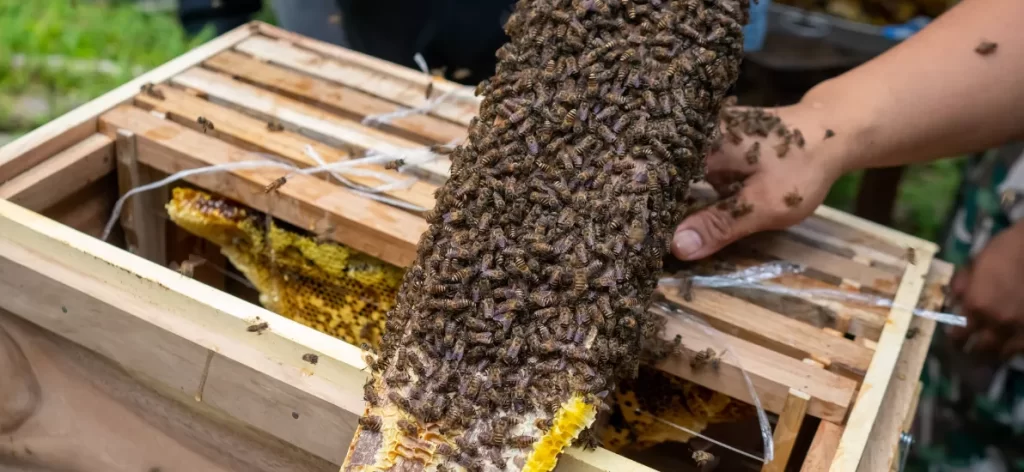People having fear of insects, especially fear of bees and wasps, usually do not prefer summer. These small animals are especially active during warmer periods of year. Being in nature, even though relaxing, usually represents a nightmare for people who suffer from these phobias.
But it does not have to be that way.
There are many animal-related fears, ranging from smaller to larger ones. As already stated, fear of bees and wasps can commonly manifest itself during both childhood and adulthood. We have yet to find the cause.
However, there is always a brighter side to this.
Bee buzzing brings life to our gardens. Bee products have many uses. We use their honey to sweeten our food and beverages. We also use honey to treat many diseases. Medical workers use bee venom to treat infections.
A bee’s main task is plant life pollination. Many plants would neither bear fruit nor produce seeds without the process of pollination. In their research, scientists have shown that without pollination, mankind’s production of food would be cut down for one third of the total amount currently produced.
We are on the verge of endangering our whole landscape, our nourishment and the future of plant and animal life as we know it.

Why do we fear these small creatures when they save us, and in doing so, are more endangered every day?
We cannot fight fears and win; we can only overcome them.
Reasons For People Having Fear Of Bees And Other Insects
Fear is one of the most basic feelings that both humans and animals can develop. It can be caused by either external stimulants, such as a person, animal or a situation, or internally (remembering a person who is real or not, or a situation that we found or could find ourselves in).
Once in a state of fear, people, either consciously or unconsciously, try to make defense from the posed threat by using every defensive mechanism available.
How many times our fear of something caused a humorous situation? Try remembering such a moment.
Research has shown that the first signs characterizing fear of bees manifest at the age of five.
The first reason is that a child of that age does not know how to react to insects’ behavior and therefore develops a fear.
The second reason is copying behavior of adults. Many parents, grandparents, or even nannies, do not suffer from fear of bees in general. However, they might not show a lot of sympathy towards bees while in presence of a child. In this particular case, a child can develop a fear of bees as a consequence of adult behavior and their stories about insects.
We have all, at least once, told a child to run away from a bee, a wasp or a grasshopper without even knowing the real reason. Even worse, we tell them different stories how a person was bitten by a big and scary bug.
Films And TV Shows Help Develop Phobias
Without any doubt, a child can develop fear of bees if it suffers a bee sting, especially during the early childhood. Parents should not make a big deal out of it and start panicking.
Fear of bees is absolutely normal and healthy, up to a certain point. Many people are afraid of insects by just seeing them; no one wants to be stung. Lack of knowledge can cause the usual fear in adults. Bees only attack when they or their beehives are under a threat. This statement is commonly not so wide-spread in public.
However, some people develop fear of bees irrationally, which can cause a lot of discomfort and anxiety without even being in their presence.
A simple buzzing sound can cause panic and fear in such intensity that a person wishes to leave the place immediately, without any reasonable thoughts. This extreme and non-existent fear is known as apiphobia.
What Is Apiphobia?
Term apiphobia is of Latin origin. Latin word “apis” is translated as bees and Greek word “fobos” is known as fear. We can also find another term for this phobia, such as melisophobia (“melisa” is a Greek word for bee).
Apiphobia is a phobic disorder and therefore an anxiety disorder. Its main symptoms are extreme fear, discomfort and anxiety, which urge people to avoid bees at any cost. Fear of other flying insects, such as wasps or hornets, can also relate to this phobia.
Apiphobia can cause life-limiting activities for people, such as avoiding spending time outdoors, in order to avoid coming into contact with bees. People suffering from apiphobia also refuse to go outside during certain climate conditions when the bee activities are increased.
However, a bee sting, while painful, does not pose a health risk, unless a person with allergies suffers multiple stings. Unfortunately, there is not much that doctors can do to resolve this problem.
Major Symptoms That Manifest If You Have A Fear Of Bees
When a person sees a bee, or even has thoughts about it, he or she can develop the following symptoms:
- horror and panic, leading up to hysteria;
- uncontrollable anxiety;
- drops in blood pressure;
- heart racing;
- thoughts of death;
- space disorientation;
- a strong urge to leave/escape the environment;
- vertigo and/or general weakness;
- increased perspiration;
In Conclusion, How To Overcome Fear Of Bees.
Most of the times, as already stated at the beginning, irrational beliefs can cause fear of bees. It can be helpful if a person tries to create a more positive view on this issue.
In order to overcome fear of bees, it is important for people to understand and be familiar with the following facts:
- bees will sting only when people provoke them;
- most of the insects do not even have a stinger (these include males and lonesome species);
- bees are incredible insects that provide us with food, medications and play an important role in the ecosystem.
The above-mentioned facts will help people with phobias to rationalize their thoughts of fear.
Many researches have shown that psychological therapies show great results in treating phobias. A therapy aiming to modify thoughts or behavior, which cause people discomfort, might be listed as an example.
When anxiety becomes severe, doctors can prescribe anxiolytics and antidepressants in order to control a person’s fear. However, people cannot use these medications without previously consulting a doctor, and undergoing a proper form of psychotherapy.
Performing different techniques, such as taking deep breaths or counting numbers, can divert a person’s attention away from bees. These techniques also improve people’s ability to overcome apiphobia, when such a case occurs.
Other methods, such as drawing pictures, reading literature or conversing with other people can help improve our fear of insects, bees in particular.
However, the main direction in treating fear of bees is gradually confronting and facing the fear itself. Being in direct contact, as a form of therapy, has shown to be an efficient way of treatment for people who are afraid of bees. Experts recommend a pleasant, open environment, such as a park or a garden, where people can gradually spend longer periods of time in bees’ environment. This process of familiarization should not be hurried, as it can take up to several months before people start feeling comfortable with the new environment.
As a rule, people can treat apiphobia successfully – either by seeking professional help or individually. The only difference is the time it takes to overcome the fear, as self-treatment is more time-consuming. A professional help will improve the odds of a person overcoming the fear of bees more efficiently in less time.

